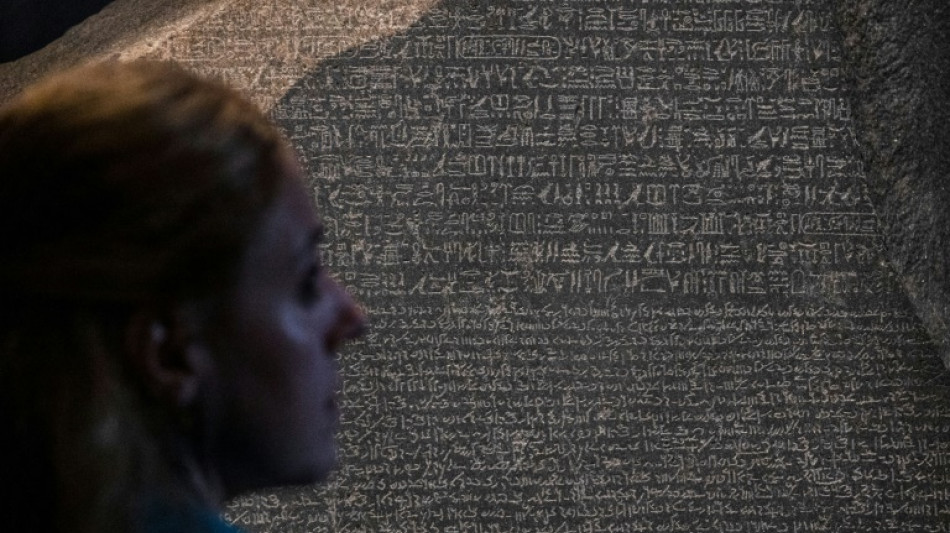
-
 Japan's Takaichi set to call February snap election: media
Japan's Takaichi set to call February snap election: media
-
Scientist wins 'Environment Nobel' for shedding light on hidden fungal networks
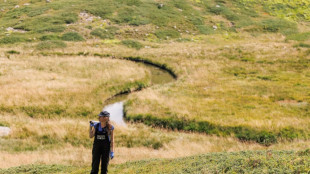
-
 From bricklayer to record-breaker: Brentford's Thiago eyes World Cup berth
From bricklayer to record-breaker: Brentford's Thiago eyes World Cup berth
-
Keys overcomes serve demons to win latest Australian Open warm-up

-
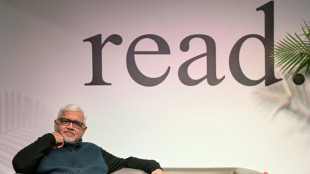 As world burns, India's Amitav Ghosh writes for the future
As world burns, India's Amitav Ghosh writes for the future
-
Actor Kiefer Sutherland arrested for assaulting ride-share driver
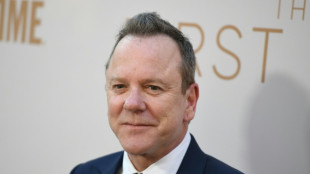
-
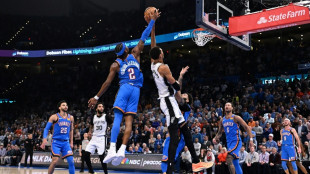 Gilgeous-Alexander shines as Thunder halt Spurs losing streak
Gilgeous-Alexander shines as Thunder halt Spurs losing streak
-
West Bank Bedouin community driven out by Israeli settler violence
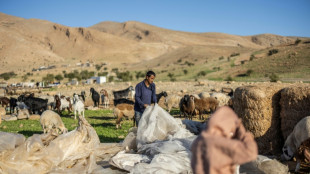
-
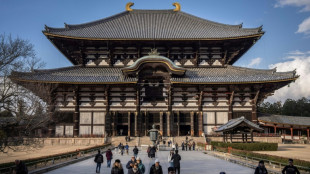 Asian markets mixed, Tokyo up on election speculation
Asian markets mixed, Tokyo up on election speculation
-
US official says Venezuela freeing Americans in 'important step'
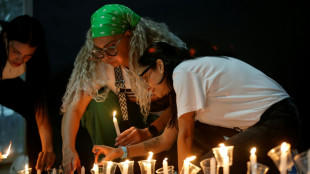
-
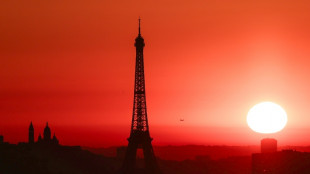 2025 was third hottest year on record: EU, US experts
2025 was third hottest year on record: EU, US experts
-
Japan, South Korea leaders drum up viral moment with K-pop jam

-
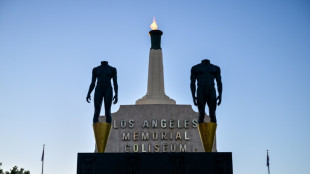 LA28 organizers promise 'affordable' Olympics tickets
LA28 organizers promise 'affordable' Olympics tickets
-
K-pop heartthrobs BTS to kick off world tour in April

-
 Danish foreign minister heads to White House for high-stakes Greenland talks
Danish foreign minister heads to White House for high-stakes Greenland talks
-
US allows Nvidia to send advanced AI chips to China with restrictions
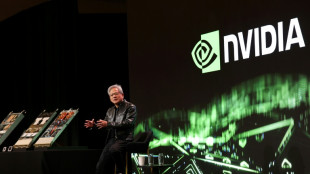
-
 Sinner in way as Alcaraz targets career Grand Slam in Australia
Sinner in way as Alcaraz targets career Grand Slam in Australia
-
Rahm, Dechambeau, Smith snub PGA Tour offer to stay with LIV

-
 K-pop heartthrobs BTS to begin world tour from April
K-pop heartthrobs BTS to begin world tour from April
-
Boeing annual orders top Airbus for first time since 2018

-
 US to take three-quarter stake in Armenia corridor
US to take three-quarter stake in Armenia corridor
-
Semenyo an instant hit as Man City close on League Cup final

-
 Trump warns of 'very strong action' if Iran hangs protesters
Trump warns of 'very strong action' if Iran hangs protesters
-
Marseille put nine past sixth-tier Bayeux in French Cup

-
 US stocks retreat from records as oil prices jump
US stocks retreat from records as oil prices jump
-
Dortmund outclass Bremen to tighten grip on second spot

-
 Shiffrin reasserts slalom domination ahead of Olympics with Flachau win
Shiffrin reasserts slalom domination ahead of Olympics with Flachau win
-
Fear vies with sorrow at funeral for Venezuelan political prisoner

-
 Pittsburgh Steelers coach Tomlin resigns after 19 years: club
Pittsburgh Steelers coach Tomlin resigns after 19 years: club
-
Russell eager to face Scotland team-mates when Bath play Edinburgh

-
 Undav scores again as Stuttgart sink Frankfurt to go third
Undav scores again as Stuttgart sink Frankfurt to go third
-
Fuming French farmers camp out in Paris despite government pledges

-
 Man Utd appoint Carrick as manager to end of the season
Man Utd appoint Carrick as manager to end of the season
-
Russia strikes power plant, kills four in Ukraine barrage

-
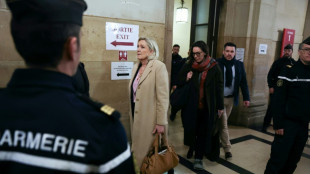 France's Le Pen says had 'no sense' of any offence as appeal trial opens
France's Le Pen says had 'no sense' of any offence as appeal trial opens
-
JPMorgan Chase reports mixed results as Dimon defends Fed chief

-
 Vingegaard targets first Giro while thirsting for third Tour title
Vingegaard targets first Giro while thirsting for third Tour title
-
US pushes forward trade enclave over Armenia

-
 Alpine release reserve driver Doohan ahead of F1 season
Alpine release reserve driver Doohan ahead of F1 season
-
Toulouse's Ntamack out of crunch Champions Cup match against Sale

-
 US takes aim at Muslim Brotherhood in Arab world
US takes aim at Muslim Brotherhood in Arab world
-
Gloucester sign Springbok World Cup-winner Kleyn

-
 Trump tells Iranians 'help on its way' as crackdown toll soars
Trump tells Iranians 'help on its way' as crackdown toll soars
-
Iran threatens death penalty for 'rioters' as concern grows for protester

-
 US ends protection for Somalis amid escalating migrant crackdown
US ends protection for Somalis amid escalating migrant crackdown
-
Oil prices surge following Trump's Iran tariff threat

-
 Fashion student, bodybuilder, footballer: the victims of Iran's crackdown
Fashion student, bodybuilder, footballer: the victims of Iran's crackdown
-
Trump tells Iranians to 'keep protesting', says 'help on its way'

-
 Italian Olympians 'insulted' by torch relay snub
Italian Olympians 'insulted' by torch relay snub
-
Davos braces for Trump's 'America First' onslaught
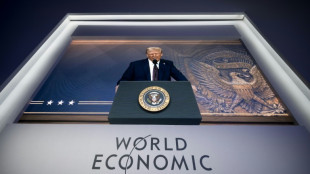

British Museum hails Rosetta Stone's role in cracking hieroglyphs
The Rosetta Stone stars in a new exhibition opening Thursday at the British Museum marking one of the most significant dates in Egyptology -- 200 years after a French scholar finally cracked its code and deciphered hieroglyphs.
The exhibition comes with the British Museum under pressure from some Egyptologists to hand the Rosetta Stone back to Cairo at a time when UK institutions are beginning to return to other countries artefacts looted during the colonial era.
Once seen as magical symbols unrelated to spoken language, Egyptian hieroglyphs were swathed in mystery for centuries until philologist Jean-Francois Champollion cracked their meaning in 1822.
French troops had discovered the stone in the walls of an Egyptian fort in 1799 and gave it to British forces as part of a surrender agreement. The British Museum has displayed it since 1802.
The basalt slab dating from 196 BC was so crucial because it has inscriptions of identical meaning in three languages: hieroglyphs, an ancient Egyptian vernacular script called Demotic and Ancient Greek, which provided the translation key.
"We decided because the Rosetta Stone was such an important key to that decipherment that we will do this properly: with an exhibition that also features our star objects," said Ilona Regulski, curator of Egyptian written culture at the museum.
"It's a wonderful moment to celebrate."
Yet the anniversary exhibition is controversial to some.
Egyptian archaeologist and former antiquities minister Zahi Hawass recently released a petition for the return of the stone and other foreign-held treasures he considers "stolen".
The British Museum told AFP that Egypt has never made a formal request for the Rosetta Stone's return.
- 'Muddied legacy' -
Regulski added that it was a "universal object" and "it doesn't really matter where it is, as long as it's available to people".
Activists from a group called Culture Unstained protested in the museum on Tuesday calling for Cairo to release political prisoners including British activist Alaa Abdel Fattah, and criticising sponsorship by BP oil giant.
The exhibition, "Hieroglyphs: unlocking ancient Egypt" tracks hieroglyphs' fall into obscurity after Egyptians switched to other forms of script.
It explores the rich discoveries about life in ancient Egypt that came from unlocking the symbols.
"For the first time in 3,000 years, Ancient Egyptians spoke directly to us," the museum's director Hartwig Fischer said.
The exhibition does acknowledge attempts by non-Europeans to grasp the symbols but focuses on the race between Western scholars to crack the code.
"Our travellers... went to Egypt and were amazed by all these intriguing picture-like signs on the temple walls," said Regulski.
This led to their "interpretation as magical signs, as secret knowledge, the idea that if you would be able to decipher hieroglyphs, you will understand the meaning of everything."
Champollion was the first to fully grasp the logic of hieroglyphs, outdoing an English rival, Thomas Young, who was in correspondence with him.
The exhibition suggests the French scholar has a "muddied legacy", however, and "often relied on the work of others", including Young.
It also depicts the more bizarre side of Egyptology including special events where enthusiasts unwrapped a mummified body and took lengths of bandages home as souvenirs.
W.Mansour--SF-PST




